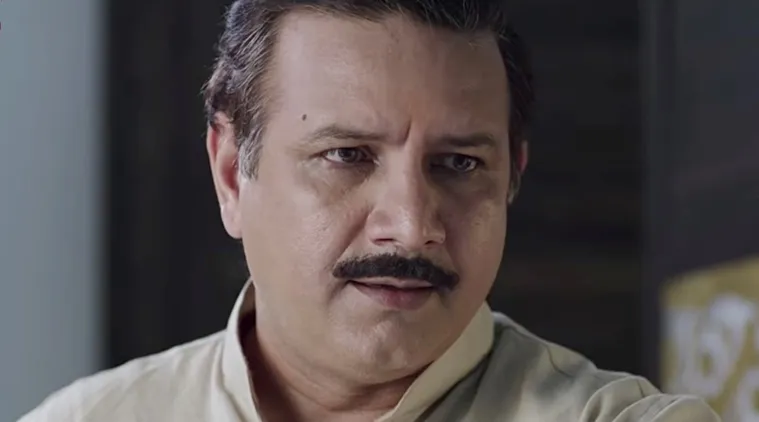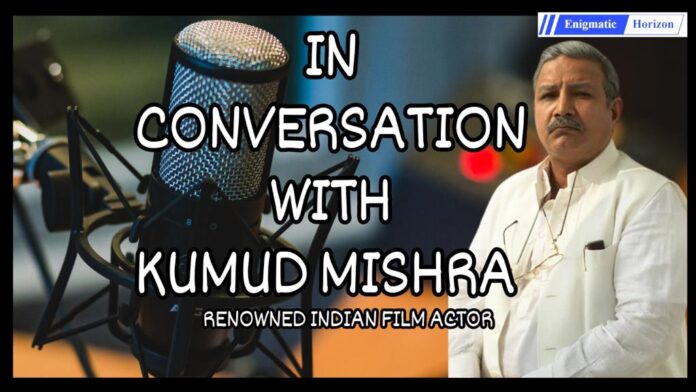Interviewed by – Robin Tyagi (Sub editor)
Written by – Nupur Jha
Edited by – Robin Bhuyan (Editor in Chief)
Kumud Mishra is a prominent Indian actor primarily recognized for his impactful supporting roles in movies, television, and web series. Some of his memorable performances include his roles in ‘Rockstar,’ ‘M.S. Dhoni: The Untold Story,’ ‘Jolly LLB 2’ ‘Jawani Janeman’ and ‘Mission Raniganj.’ He has also been a part of web series such as ‘TVF Tripling,’ ‘Tandav,’ and ‘Dr. Arora.’
In an exclusive interview with Enigmatic Horizon, Kumud Mishra shares his insights on various topics, including the recent controversy surrounding the film ‘Animal,’ and the influence of cinema on society. The actor also reflected on his journey as an actor.
How do you differentiate between lead and supporting roles? Can you share your experience working in front of the camera?
I don’t approach my work having the distinction between a supporting or lead role in mind. Regardless of the characters assigned to me, my focus is to portray them as honestly as possible. Ultimately, my approach to acting remains consistent, whether the role is a main character or not.
How did you decide to become an actor, and what made you want to do it?
You figure out how to get into acting and directing as you go along. It becomes a natural part of your life without you even realizing it. For me, my dad and granddad played a significant role, and going to military school with its cultural activities had an impact, too. I have always liked theater from an early age as well.

Talking about your first role in Sardari Begum, how was your experience acting alongside the legendary actor Amrish Puri? Were you anxious or nervous?
No, because back then, I wasn’t really into movies. I loved doing theater at the time. When I started acting, I did get stage fright, and I still get nervous at times. But I always focus on doing my job well and meeting the director’s expectations. Working with Amrish Puri wasn’t scary—he was someone I looked up to, an actor whose work inspired me to do better. Overall, I’ve never been intimidating by my co-actors, and they weren’t either, by me.
Does Kumud Mishra get nervous or anxious? Or did you ever think that you wouldn’t pull off certain roles in front of the camera?
Yes, it happens a lot, especially for the stage or new projects. The first days are always challenging; you feel people will judge or be uncomfortable adjusting to a new crew. However, once you get familiar, everything gets alright. So, I would say it’s not the camera that scares me, but the fear of failing that scares me more.
Do you feel you have achieved a certain level of fame or recognition in the industry?
I don’t even know my place or level. There is no destination for acting; it’s a very long journey. It has a similar feeling of achieving more, like starting in a small space room, then moving to a slightly bigger apartment, and then dreaming of having a house in a city. The greed keeps growing and never ends. It’s the same with work as well.
How do you pick the roles you play?
I review the script first; if it’s interesting, then I think about the role. Sometimes, I may choose smaller roles because of my relationship with the director. Occasionally, it’s influenced by financial factors as well, even if the script or character isn’t very strong. But, overall, the script is the key factor. I’m willing to take on smaller roles if they offer a challenge and if the directors help enhance my skills as an actor.
Is there any role that you have played that is your favorite?
Picking a favorite role is tough; each one comes with its challenges. It might seem odd to have a favorite. Every character I’ve played pushed me to explore new things as an actor, which is important to me.
Do you think about making a social impact with your roles? Or do you avoid negative roles that might send the wrong message?
I don’t let worries about how people perceive me, whether positively or negatively, guide my choices. If I turn down a role as an actor, it’s because the character’s actions don’t make sense to me. I steer clear of roles chosen solely for their impact without a clear understanding of the character’s motivations. Additionally, I’m firm about not participating in films with a hidden agenda that could misrepresent society. It’s my responsibility as an actor to maintain a positive influence.
Talking about cinema’s social responsibility, what do you think it should be?
The main job of cinema is to entertain people. But there’s also a responsibility to make sure movies don’t add to any problems in society. Making films just for a specific agenda isn’t the right thing to do.
After school, movies have a significant influence on students. Do you think films are negatively impacting today’s kids?
I think the problem is that we treat films too seriously. Cinema is primarily for entertainment and escapism, and it should not have a harmful impact on kids. The most significant influence comes from society, be it parents, school, or friends. Cinema often brings up hidden subjects that may not be immediately apparent. If society wishes to be influenced positively, plenty of great movies can contribute to that.

Recently, a movie named Animal with a lot of violence has been released. Some people including many critics argue that it should not be shown at this level. What’s your take on it?
Violence is a reality in the world, so why not depict it in movies? Films can sometimes be politically charged, but if people are liking it, it is their choice. This is why it won’t make sense to ask filmmakers to stop making such movies. There’s no clear right or wrong, and cinema shouldn’t be blamed if society is being negatively influenced. Society has evolved beyond that point, and people should be capable of analyzing and making choices for themselves.
Talking about Indian award shows, what’s your opinion on their credibility?
These ceremonies are meant to acknowledge the performances within the industry. While they may not be flawless and can sometimes show biases or make wrong choices, it’s not an issue of credibility.
I don’t see any problem with the awards; the debates around them should continue. Comparing two actors is not like boxing or sports; it’s subjective and allows for diverse opinions.
After the Covid situation, the cinema landscape has changed significantly, with more people preferring OTT platforms. What change do you think OTT will bring about?
I don’t believe people will entirely choose OTT over cinema. Currently, discussions aren’t centered on whether a film is good or bad but rather on its box office earnings. Despite the rise of OTT, people continue to watch movies in theaters. We’ve witnessed significant hits like ‘Pathan,’ ‘Jawaan,’ and more recently, ‘Animal.’ OTT also has its importance, as it provided employment opportunities to a large population in the entertainment industry. The platform has also given filmmakers the freedom to explore diverse subjects as well.
Can you share any details on your future projects?
I have some projects in the pipeline, but they have yet to be officially announced.
Thank you for your time! It was a pleasure talking to you!
Thank you so much.
